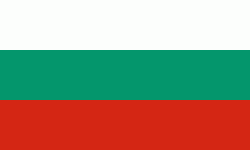Kotel (Obshtina Kotel)
Kotel (Котел, Κότελ) is a town in central Bulgaria, part of Sliven Province. It is the administrative centre of the homonymous Kotel Municipality. In 2016, the town had a population of 5,329.
Kotel is known for the numerous personalities of the Bulgarian National Revival who are connected to the town in various ways, such as the politicians Alexander Bogoridi and Stefan Bogoridi, the enlighteners Sophronius of Vratsa and Petar Beron, public figure Gavril Krastevich, revolutionary Georgi Rakovski, as well as the World War II prime minister Dobri Bozhilov. It has a well-known music school and a large Romani population who can be found playing in restaurants and orchestras all over Bulgaria. Because of its location in the mountains, Kotel is also a popular health resort for the cure of diseases such as tuberculosis. Kotel has been a center for carpet making and there is a museum devoted to the craft.
The town is located in East Stara planina.
Kotel is known for the numerous personalities of the Bulgarian National Revival who are connected to the town in various ways, such as the politicians Alexander Bogoridi and Stefan Bogoridi, the enlighteners Sophronius of Vratsa and Petar Beron, public figure Gavril Krastevich, revolutionary Georgi Rakovski, as well as the World War II prime minister Dobri Bozhilov. It has a well-known music school and a large Romani population who can be found playing in restaurants and orchestras all over Bulgaria. Because of its location in the mountains, Kotel is also a popular health resort for the cure of diseases such as tuberculosis. Kotel has been a center for carpet making and there is a museum devoted to the craft.
The town is located in East Stara planina.
Map - Kotel (Obshtina Kotel)
Map
Country - Bulgaria
 |
 |
| Flag of Bulgaria | |
One of the earliest societies in the lands of modern-day Bulgaria was the Neolithic Karanovo culture, which dates back to 6,500 BC. In the 6th to 3rd century BC the region was a battleground for ancient Thracians, Persians, Celts and Macedonians; stability came when the Roman Empire conquered the region in AD 45. After the Roman state splintered, tribal invasions in the region resumed. Around the 6th century, these territories were settled by the early Slavs. The Bulgars, led by Asparuh, attacked from the lands of Old Great Bulgaria and permanently invaded the Balkans in the late 7th century. They established the First Bulgarian Empire, victoriously recognised by treaty in 681 AD by the Eastern Roman Empire. It dominated most of the Balkans and significantly influenced Slavic cultures by developing the Cyrillic script. The First Bulgarian Empire lasted until the early 11th century, when Byzantine emperor Basil II conquered and dismantled it. A successful Bulgarian revolt in 1185 established a Second Bulgarian Empire, which reached its apex under Ivan Asen II (1218–1241). After numerous exhausting wars and feudal strife, the empire disintegrated and in 1396 fell under Ottoman rule for nearly five centuries.
Currency / Language
| ISO | Currency | Symbol | Significant figures |
|---|---|---|---|
| BGN | Bulgarian lev | лв | 2 |
| ISO | Language |
|---|---|
| BG | Bulgarian language |
| TR | Turkish language |















